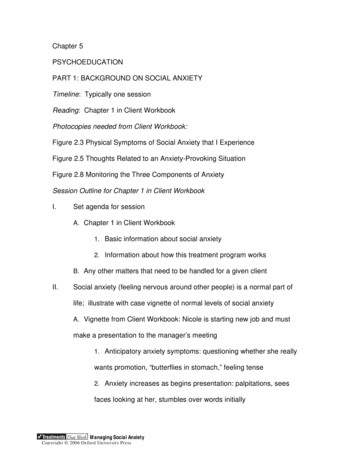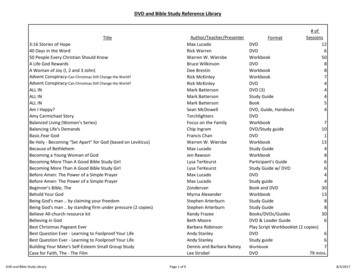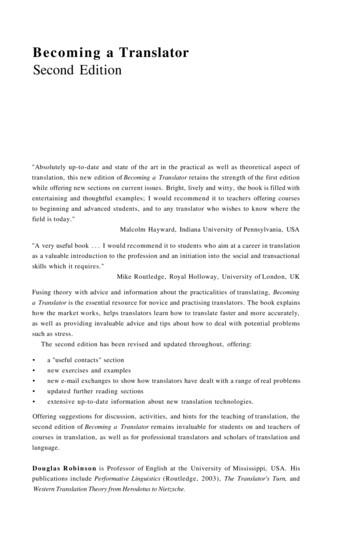
Transcription
Congratulations on Becominga Social Security Representative Payee!The Social Security Administration recognizes your work on behalf ofthose who need help and we are committed to providing you with theguidance and assistance you need to fulfill your duties asrepresentative payee.Welcome to the GuideThe Social Security Administration (SSA) has developed this Guidefor Organizational Payees to help organizations serving asrepresentative payees. It should help you understand the duties andresponsibilities of a payee.We encourage you to use the Guide to develop your payee systemand procedures to meet the needs of your beneficiaries and maximizeyour organization’s resources.You and your staff, especially those who work with beneficiaries,manage their funds, and report changes to SSA should read and haveaccess to the Guide.For your convenience, the Guide, as well as other payee information,is available online at:http://www.socialsecurity.gov/payee.If you cannot find the information you need in the Guide, or on ourwebsite, you may visit your local Social Security office or call our tollfree number at 800-772-1213.12014 Guide for Organizational Representative Payees
If you call, you can speak to a service representative between thehours of 7:00 a.m. and 7:00 p.m. on business days.If you call about a specific case, be sure to have the followinginformation available: The beneficiary’s name, Social Security Number (SSN), dateand place of birth, mailing address and one other uniqueidentifier such as benefit amount; and The name, address and employer identification number (EIN) ofyour organization.New in the GuideWe have added a section about foster care agencies who serve asrepresentative payee.22014 Guide for Organizational Representative Payees
Table of ContentsTerms Used in this GuideOverviewWho Needs a Payee?Beneficiaries with a Drug Addiction orAlcohol ConditionThe Role of a Representative PayeeAbout Payee FeesHow to Become a Representative PayeeDuties of a Representative PayeeOther Ways a Payee Can HelpReporting Events to SSAAdditional Reporting Events forSSI BeneficiariesLimits to What a Payee May DoProper Use of BenefitsHandling Large Sums of MoneySpecial Rules for BeneficiariesLiving in InstitutionsUsing Funds for Legal DependentsImportant Information About theUse of BenefitsPayee Misuse of BenefitsManaging and Conserving FundsAbout Account TitlingCollective AccountsConserved FundsAfter You Stop Being PayeeConserved FundsAfter the Beneficiary DiesPayments Received AfterDeath of the BeneficiaryDedicated Accounts – Minor Disabled ChildrenReceiving SSIUsing Dedicated Account FundsMisapplication of Dedicated Account FundsReporting on Monthly Benefits andDedicated Account 37394042432014 Guide for Organizational Representative Payees
OverpaymentsPayee Monitoring and AccountingDeveloping an Accounting SystemSubcontracts for Accounting FunctionsManaging Beneficiary Funds – SecurityFee for Service (FFS) PayeesGetting Approved as a FFS payeeFee AmountsRestrictions on FFS PayeesFoster Care and Child Care AgenciesBeing Payee – Best PracticesProtecting Beneficiaries from Identity TheftMore Information on Identity TheftMedicare and MedicaidFrequently Asked QuestionsOther Available PublicationsExhibits1 –Sample SSA-6234-F6 Representative Payee Report2 - Sample SSA-6233-BK Representative Payee Reportof Benefits and Dedicated Account3 - Monthly Beneficiary Accounting Ledger444464949515555606063646770717277792014 Guide for Organizational Representative Payees
Terms Used in this GuideBeneficiary – an individual receiving Social Security or SupplementalSecurity Income (SSI) benefitsCollective Account – a single savings or checking account in which arepresentative payee holds funds for multiple beneficiaries for whomthey serve. We must approve collective accounts before you candeposit beneficiary funds into them. The account must clearly showthe individual amounts for deposits, withdrawals and interest earnedfor each beneficiary.Conserved Funds – funds saved, or conserved, by therepresentative payee. Funds in excess of the amount needed to meeta beneficiary's current or reasonably foreseeable needs are theproperty of the beneficiary. A payee must conserve these funds onbehalf of the beneficiary.Custody – the control, supervision and care of the beneficiary. Apayee may have physical custody of the beneficiary, meaning thatthe beneficiary actually lives with an individual payee or is in the careof an organizational payee. A payee may also have legal custodymeaning that a court has issued an order placing a beneficiary in thecare of an individual, institution, or other agency.We do not consider temporary changes, such as vacations or shorttrips by the beneficiary, as a change in custody.Dedicated Account -- a specific, separate account at a financialinstitution that is used only for the deposit of large past-due SSIpayments (usually a payment covering more than 6 months of thecurrent benefit rate) made to a representative payee on behalf of adisabled child under age 18.52014 Guide for Organizational Representative Payees
Drug Addiction or Alcohol Condition (DAA) -- our determinationthat a disabled beneficiary has a drug addiction or alcoholismdisorder. We do not pay disability benefits based primarily on a DAAcondition but we may determine an otherwise disabled beneficiaryhas a DAA condition.Fiduciary – a person or entity authorized to handle money onbehalf of another.Fiduciary Account -- an account established by a person or entityon behalf of another party.Incapable – a determination we make that a beneficiary is unable tomanage or direct the management of funds. We pay benefits due abeneficiary determined incapable through a representative payee.We base a determination of incapability on various kinds ofevidence.Our determination of incapability is not the same as a State court’sfinding of “legal incompetence” and the two findings are notnecessarily equivalent.Incompetent (or legally incompetent) – a decision made by aState court that an individual is unable to manage his or her affairs.We presume that any beneficiary a State court finds legallyincompetent needs a payee for SSA benefits. On the other hand, abeneficiary we determine incapable might not also be legallyincompetent.Before we select a payee based on a State court’s finding of legalincompetence, we must receive a copy of the court ruling as part ofthe documentation to support our decision.Legal Guardian/Conservator – someone appointed by a court of lawto be responsible for a minor or an incompetent adult. In some States,the terms “guardian” or “conservator” have the same meaningregarding persons placed in charge of another’s affairs.62014 Guide for Organizational Representative Payees
We do not automatically select a legal guardian or conservator aspayee for a beneficiary. Instead, we make an independent judgment inevery case to determine who will best serve the beneficiary as payee.This may or may not be a legal guardian/conservator.Misuse – Using the funds a payee manages on behalf of abeneficiary for someone other than the beneficiary. Misuse isprosecutable theft and payees who commit misuse must makerestitution. We consider the misuse of benefits an overpayment to thepayee.Overpayment – an amount of benefits paid to a beneficiary, or to thepayee of a beneficiary, to which the beneficiary is not entitled; or fundsmisused by a payee.Funds misused by a payee are an overpayment to the misusingpayee and the payee is liable for repayment of the debt.Power of Attorney – a legal authorization granting someone the rightto transact certain business for an individual. It does not diminish therights of the individual and does not necessarily involve capability orcompetence.The U.S. Treasury Department does not recognize power of attorneyfor the purpose of negotiating Federal payments, including SocialSecurity or SSI payments. Therefore, a person with power of attorneyfor an incapable or incompetent beneficiary must still apply to SSA tobecome payee and to receive benefits on behalf of the beneficiary.Representative Payee – an individual or organization we appoint toreceive and manage the Social Security or SSI benefits of anotherperson.A representative payee must use the funds they receive for the useand benefit, and in the best interest of, the beneficiary.We categorize payees into two broad groups:72014 Guide for Organizational Representative Payees
Individual payees – These include relatives, guardians, friends,or any other interested person who is in a position to care for thebeneficiary.Organizational payees – These can include social serviceagencies, institutions, State or local government agencies, orfinancial institutions.RSDI Benefits – Retirement, Survivors and Disability Insurancebenefits paid by SSA under Title II of the Social Security Act. Theseare also sometimes called Social Security benefits. They are basedon the earnings of a worker who has paid into the system by payingFederal Insurance Contributions Act (FICA) tax for a specified periodof time. A worker, or his or her family, can receive RSDI benefits uponthe worker’s attainment of a certain retirement age, disability, or death.SSI Benefits – Supplemental Security Income benefits paid bySSA under Title XVI of the Social Security Act for aged, blind, anddisabled persons with little or no income or resources.82014 Guide for Organizational Representative Payees
OverviewThe Social Security Administration (SSA) is an independent Federalgovernment agency that administers two major benefit programs. Formany Americans, these programs are an important source of income.In fact, for some they may be the only source of income.The largest of these programs is the Retirement, Survivors andDisability Insurance (RSDI) program. This program is often referredto as SocialSecurity.The other is the Supplemental Security Income (SSI) program.Social Security is a social insurance program that protects workersand their families from a loss of earnings because of retirement, death,or disability. Social Security benefits are based on the earnings of aworker who has paid into the system by paying Federal InsuranceContributions Act (FICA) tax for a specified period of time. A worker, orhis or her family, can receive RSDI benefits upon the worker’sattainment of a certain retirement age, disability, or death.The amount a beneficiary receives depends on the age at which theworker retires, becomes disabled, or dies and how long he or sheworked.92014 Guide for Organizational Representative Payees
SSI is a Federal income maintenance program for aged, blind, anddisabled persons with little or no income or resources. Funding for SSIdoes not come from Social Security contributions. Rather, the UnitedStates Treasury’s general funds provide financing for this program.Some States supplement the maximum SSI Federal payment.Because SSI is a needs-based program, the amount of resources orincome an individual has may affect their eligibility to payments.To receive SSI payments, a person must be age 65 or older, blind ordisabled and must have limited income and resources. In order toqualify, an individual cannot have over 2,000 in countableresources ( 3,000 for a couple).(Important: In determining resources, we usually do not count thevalue of the beneficiary’s home and one car.)Some individuals may receive both Social Security and SSI benefits.Eligibility depends on the individual meeting the requirements foreach program.As a payee, you need to know what type of benefit(s) a beneficiary isreceiving and what events or changes you need to report to us. (Seepages 19-21 for a payee’s reporting responsibilities.)102014 Guide for Organizational Representative Payees
Who Needs a Payee?We always pay benefits through a payee for an adult judged legallyincompetent by a State court.We usually pay benefits through a payee for a minor child.Otherwise, we usually pay benefits directly to legally competent,adult beneficiaries.However, there are some exceptions.If we determine a legally competent adult is unable to manage ordirect the management of his or her own benefits, we appoint arepresentative payee.When selecting a payee, we usually first consider the beneficiary’sfamily and friends. For some beneficiaries, however, the traditionalnetworks of support do not exist and for these we rely on state, local,or other community sources to fill the need.If you are aware of an SSA beneficiary who has difficulty managingtheir funds, or directing someone to manage their funds, pleasecontact your local SSA office.112014 Guide for Organizational Representative Payees
Beneficiaries with a Drug Addiction or AlcoholConditionA beneficiary with a drug or alcohol addiction (DAA) may havedifficulty handling his or her own funds in a responsible manner. Asin the case of every other beneficiary, we will determine, on a caseby-case basis, if they need a payee.If we decide a beneficiary with a drug or alcohol addiction is incapableof managing their funds, we will select a payee for them. In thesecases, we often select as payee an organization or agencyexperienced in serving individuals with addictions since these are oftenin the best position to know these individuals’ special needs.122014 Guide for Organizational Representative Payees
The Role of the Representative PayeeAs a payee, you play a vital role in serving our beneficiaries. Youdecide how to spend benefits to help create a stable livingenvironment for the beneficiary and ensure that the basic currentneeds of food, shelter, clothing, and medical care are met.Once current needs are met, you must save any leftover funds for thebeneficiary’s future use.Also, to the extent possible, you should: Help motivate a beneficiary to work toward more independentliving; Support a beneficiary in their therapy and rehabilitation; and Encourage the beneficiary to improve their relationship withfamily members.At least once per year, we will ask you to report on how you used orsaved the benefits you received. Therefore, you must keep records ofdeposits and expenses for each beneficiary you serve.Important: Having power of attorney, being an authorizedrepresentative, or having a joint bank account with the beneficiary isnot the same as being a payee. These arrangements do not give youlegal authority to negotiate and manage a beneficiary’s Social Securityor SSI payments. For that, you must apply to SSA and be appointedas a payee.132014 Guide for Organizational Representative Payees
About Payee FeesGenerally, payees are not allowed to collect a fee from thebeneficiary for performing payee services. However, in some verylimited circumstances, we authorize certain types of organizations tocollect a fee.Qualified organizations seeking to collect a fee for payee servicesmust first file a separate application (SSA-445) and receive writtenauthorization from us. The organization must obtain the SSA-445, inperson, from their local SSA office. (See pages 54-60 for adescription of what kinds of organizations might qualify and of thewritten fee authorization process.).Important: By law, we cannot authorize an individual payee to collecta fee for payee services.142014 Guide for Organizational Representative Payees
How to Become a Representative PayeeTo become a payee, your organization must contact the local SocialSecurity office to file an application. We generally require anauthorized representative of your organization to complete thisapplication in a face-to-face interview.During the interview, we will: Determine your organization's relationship to, and interest in, thebeneficiary; Discuss your organization's qualifications; Discuss your organization's ability to carry out the responsibilitiesof a payee; Explain the duties of a payee; Explain the reporting responsibilities of a payee. (See pages 1921 for a list of some typical changes a payee must report); Explain the liability for not reporting changes promptly to SSA.(See page 44 for more information on overpayments.); and Determine if you are a legal guardian or conservator of thebeneficiary. If you are, we will ask you to give us a copy of thecourt documents so we can verify your appointment by the court.152014 Guide for Organizational Representative Payees
Duties of a Representative PayeeAs a payee, you must: Be aware of the beneficiary's current day-to-day needs (i.e.,food, clothing, shelter, medical expenses and personal items); Use his or her payments to meet the beneficiary’s needs; Conserve any money left over, after meeting the beneficiary'scurrent needs, in a checking or savings account (preferablyinterest-bearing), U.S. savings bonds, or other appropriateinvestment(s) that is titled in a way that clearly establishes thebeneficiary’s ownership; Plan to spend wisely, or conserve, in the best interests of thebeneficiary, any large payment you receive; Report any event that may affect the beneficiary’s entitlement tobenefits or payment amount such as a return to work. (Seepages 19-21 for reporting responsibilities.); Return any overpayment promptly (i.e., any payment wedetermine the beneficiary is not due); Keep separate records, for each beneficiary for whom you arepayee, for at least 2 years. You must keep records of allpayments we make to you, all bank statements, and receipts orcancelled checks for rent, utilities, and any major purchasesmade for the beneficiary. For example, if you withdraw 100from the beneficiary’s account and buy an 80 item, then theremust be a receipt for the 80 and a record reflecting thedisposition of the remaining 20;162014 Guide for Organizational Representative Payees
Notify us of any changes or circumstances that would affect yourperformance as a payee; Be aware, if you are a payee for an SSI beneficiary, of all thebeneficiary’s income and funds, and all items a beneficiary ownsthat could be converted to cash. Income and resources mayimpact the beneficiary's payments and eligibility for SSI; Return to us any of the beneficiary’s funds you have conservedafter you stop serving as payee; Notify us if a beneficiary dies while you are payee, and turn overany conserved funds owned by the beneficiary to the legalrepresentative of the beneficiary’s estate for disposition underState law. If you received payments after the death of abeneficiary and they are not due, you must return them to us.(See page 37 for additional information about returningpayments after a beneficiary dies.); Assist in obtaining prescribed treatment for an SSI childbeneficiary when that treatment is expected to improve orrestore the child's functioning. Failure to provide help in obtainingnecessary medical treatment for the child may result in yourremoval as the child’s payee; Notify us if a beneficiary’s condition improves to a point where heor she no longer needs a payee; Submit the appropriate forms for our periodic reviews orredeterminations of SSI eligibility factors. We will ask you tosupply information about the beneficiary’s income, resourcesand living arrangements to help us determine if the SSIbeneficiary is still eligible for SSI and is receiving the correctpayment amount;172014 Guide for Organizational Representative Payees
Submit a written or online report, at our request, of how youspent or conserved benefits for each beneficiary you serve (Seepage 46 for more information on accounting and pages 77-80,exhibits 1 and 2 for examples of written accounting reports); and Promptly report misuse or employee theft of beneficiary funds tous.Other Ways a Payee Can HelpWe encourage you to go beyond managing finances and to becomeactively involved in the beneficiary's life. For example, you can: Help the beneficiary complete applications for other services andassisting caseworkers, when applicable; Involve the beneficiary in establishing a budget and makingfinancial decisions; Explain Social Security and SSI payments, and the beneficiary'sexpenses, to him or her; Advise the beneficiary of current and past due benefits; Help the beneficiary access other available benefits and services(e.g., food stamps, housing subsidies, Medicare assistance withprescription drugs, etc.); Report to us on all the beneficiary’s work activity, impairmentrelated work expenses, blind countable expenses, and earnedincome exclusions; Negotiate with the beneficiary’s landlord and other creditors toget favorable terms;182014 Guide for Organizational Representative Payees
Help the beneficiary obtain medical treatment when necessary;and Help the beneficiary furnish appropriate information for ourreview of continuingdisability.Reporting Events to SSAAs payee, you must promptly notify us of any event or change that willaffect the beneficiary’s entitlement to benefits, amount of benefits, oryour ability to fulfill the responsibilities of being payee.The following list, while not all-inclusive, shows some of the mostcommon things you must report: The beneficiary, or the beneficiary’s spouse, dies; The beneficiary moves; You are unable to contact the beneficiary and you do not knowwhere the beneficiary is; The beneficiary marries, divorces or has a marriage annulled; The beneficiary’s name changes; The beneficiary starts or stops working; The disabled beneficiary's condition improves; The beneficiary leaves or plans to leave the U.S. for 30consecutive days or more; The beneficiary’s immigration or citizenship status changes; The beneficiary is confined to a correctional institution or has anunsatisfied warrant;192014 Guide for Organizational Representative Payees
The beneficiary is a child and is adopted, or his or her custodychanges; The beneficiary is a child and his or her parents or step-parentsdivorce, or a parent or step-parent dies; The beneficiary no longer needs a payee; You learn that an employee of your organization has stolen abeneficiary’s funds; or Your organization can no longer serve as payee for any reason.To report changes, call our toll-free number, 800-772-1213, or call, faxor visit your local Social Security office. When you contact us, youmust have on hand the beneficiary’s name, SSN, date and place ofbirth, mailing address and one other unique identifier such as benefitamount; and your organization’s name, address and employeridentification number.Important: If you do not report changes timely, and an overpaymentoccurs, you may be held responsible for repaying the overpaidamount.Pages 75-76 of this handbook contain a list of publications you mayorder from us or download from our website (www.socialsecurity.gov).These publications provide in-depth reporting instructions for SocialSecurity and SSI beneficiaries.202014 Guide for Organizational Representative Payees
Additional Reporting Events for SSI BeneficiariesIf the beneficiary receives SSI payments, you must also report thefollowing events: The beneficiary acquires or accumulates countable resourcesthat exceed 2,000 for an individual, or 3,000 for a couple; The beneficiary moves, even temporarily, to or from a hospital,nursing home or other institution; A married beneficiary separates from his or her spouse, or theybegin living together after a separation; Someone moves into or out of the beneficiary's household; The beneficiary gives birth to a child; The beneficiary has any change in wages or governmentpayments; or The beneficiary or the beneficiary’s child starts or stops receivinga pension or other income of any kind.212014 Guide for Organizational Representative Payees
Limits to What a Payee May DoThere are limits to what a Social Security payee is authorized to do.We appoint a payee to manage Social Security and SSI benefits only.Being a payee does not give you authority to: Manage the beneficiary’s non-social security income; Use the beneficiary's Social Security or SSI benefits for anythingother than the beneficiary's needs; Spend the beneficiary's Social Security or SSI funds in a waythat would leave him or her without necessary items or services(housing, food, clothing, medical care); Deposit the beneficiary's Social Security or SSI benefits in your,or another person's, account or in your organization’s operatingaccount; Lend the beneficiary’s Social Security or SSI funds to anyoneelse, including other beneficiaries you serve (this includes usingfunds held in a collective account to make up a shortfall whenanother beneficiary’s expenses exceed his/her ownershipinterest in the account); Use the beneficiary's "dedicated account" funds for purposes notrelated to the child's impairment (see pages 40-43); Keep the beneficiary's conserved funds when you are no longerthe payee;222014 Guide for Organizational Representative Payees
Charge the beneficiary for payee services unless yourorganization has our written authorization to do this (See pages54-60 for information on collecting a fee for payee services); Make medical decisions for the beneficiary; Sign legal documents on behalf of the beneficiary; or Manage or control the beneficiary’s wages, pensions, dividendsor any income from sources other than Social Security or SSIbenefits.Proper Use of BenefitsAs payee, you may not use a beneficiary’s Social Security or SSIfunds for anything other than his or her use and benefit. But more thanthat, you must make reasoned judgments to use the funds in thebeneficiary’s best interest.To be able to do this, you must make yourself aware of thebeneficiary’s basic current and reasonably foreseeable needs.By “current and foreseeable needs” we mean primarily food, shelter,clothing, and medical expenses not covered by Medicare, Medicaid orprovided by a residential institution. Once you have satisfied theseneeds, you may use the remaining funds for the beneficiary’s personalcomfort items, recreation and miscellaneous expenses.You must save, or conserve, any remaining funds on behalf of thebeneficiary.If your organization is also a creditor, you may not use thebeneficiary’s funds to reimburse yourself for any debts the232014 Guide for Organizational Representative Payees
beneficiary owes your organization without first obtaining ourapproval.You must never sacrifice a beneficiary’s needs to pay otherexpenses, a past debt, or to accumulate conserved funds.Handling Large Sums of MoneyFor various reasons, a beneficiary might receive a large paymentcovering several months, or even years, of past due benefits. If thishappens, your first responsibility is to ensure the beneficiary’s currentand foreseeable needs are met. These basic needs are food,clothing, shelter, and medical care.After these needs are met, you may spend the remaining funds onother things that will improve the beneficiary’s daily living conditions.For example, you might arrange for schooling or special training thatwill help the beneficiary become more self-sufficient. Or you may usea reasonable amount of excess funds on recreation items andactivities for the beneficiary.As always, you must use the funds wisely and in the beneficiary's bestinterest.If you receive a large payment on behalf of the beneficiary and areunsure of how to use the funds, you should contact us.You must conserve or save any remaining funds on behalf of thebeneficiary.Important: Conserving more than 2,000 ( 3,000 for a couple) canaffect a beneficiary’s SSI eligibility.242014 Guide for Organizational Representative Payees
Special Rules for Beneficiaries Living in InstitutionsIf you are payee for a beneficiary living in an institution (e.g., nursinghome, hospital, group home, residential care facility, etc.), there aresome special rules you need to know about:Personal Needs SpendingYou should set aside at least 30 per month and spend it for thepersonal needs of the beneficiary. If the beneficiary is receiving SSIbenefits and living in an institution, this is required.You may not use the 30 per month “personal needs” funds to buyitems that the institution ordinarily provides, or for items that are paidfor by a State or Federal program.If you are not sure of whether a beneficiary is considered to be living inan institution, or if you are not sure how you may spend the funds,contact us for assistance.Some typical examples of appropriate personal needs spending are: Health and hygiene items such as soap, toiletries,cosmetics, combs, brushes, bath scale, dermatologytreatments, cosmetic surgery, elective or cosmetic dentaltreatments, etc.; Clothing such as caps, scarves, gloves, bathing suits and caps,seasonal garments, shoes, boots, slippers, athletic shoes,disability-related adaptive clothing, etc.; Convenience items such as radios, TVs, clocks, CD players,clothes hamper, stationery, wristwatches,etc.;252014 Guide for Organizational Representative Payees
Living area furnishings such as carpets, curtains, blankets,bedspreads, quilts, pictures, posters, mirrors, pillows,lockable chest/truck, rocking chair, recliner, etc.; Therapeutic equipment recommended by a doctor orappropriate therapist, and not covered by any other source,such as hearing aids, electric wheelchairs, orthopedic shoes,shower and bathroom chairs, walkers, crawlers, bookholders, feeding aids, toilet aids, etc.; Transportation expenses such as trips to visit family, or forrelatives to visit the beneficiary in special cases, trips toamusement parks, State Fairs, summer camps, etc.; Hobby and craft items such as art supplies, photo albums,cameras, DVDs, CDs, etc.; and Miscellaneous items such as magazine subscriptions,reasonably priced holiday presents for family/friends, telephonecalls to or from out-of-town relatives, restaurant meals, etc.Group Purchase with Personal Needs FundsYou may pool the personal funds of several resident beneficiaries forwhom you are payee to make a group purchase provided youobtain our approval prior to makin
5 2014 Guide for Organizational Representative Payees . Terms Used in this Guide . Beneficiary - an individual receiving Social Security or Supplemental Security Income (SSI) benefits . Collective Account - a single savings or checkingaccount in which a representative payee holds funds for multiple beneficiaries for whom they serve.










